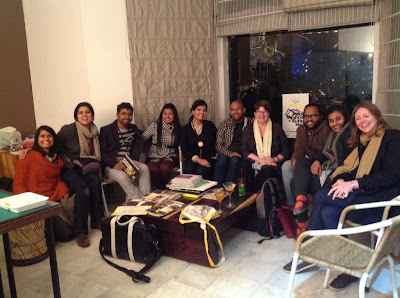Every so often an opportunity comes along
which encourages you to think differently about your worldview. In my case,
this was an invitation from the organizers of the UnBox Festival 2013 (7-10 February, New Delhi, India) and the
British Council to mentor a small invited group of designers, writers and
illustrators based in India. Our task was simple: to produce a fanzine during
the four-day Festival with a view that it should be off press in time for the
participants to take a copy home with them at the end of the event.
Whilst this in and of itself was an intriguing
proposition, what I wasn’t so keen to do was merely produce a publication which
was a document of the event. Rather, there was a more fundamental question to
ask: what might the fanzine format provide as an active space for making? And,
in particular, in what ways might the fanzine format facilitate a deeper
understanding of the Festival’s remit of exploring ‘action at the
intersections’?
So, as we approached this task, we found
ourselves asking what ‘Indian design’ might mean. The seven participants soon
made me aware that India is a huge country and the diversity of its design
perspectives meant that there was not one single identifiable approach or
definition to ‘design’. This was reflected in the work, which suggested that
diversity was a strength and not a problem. The fanzine became a focus through
which our conversations took place. These ranged from the legacy of textile archives
and the noticeable absence of a history of design in India to the increasing
importance of the role of designers and social design practices.
In a series of accompanying ‘writing for
design’ workshops, participants found their own voices, contributing personal
perspectives on what it means to be a designer in India today. Zine Press contains some of these
writings. For example, Rohan Patankar, a final year architecture student from
SPA, Delhi, reflected on the importance of scale in urban spaces in his piece
on ‘Smallness’. Gauri Sanghi, an art and design practitioner, provides insights
into the Festival’s notion of interdisciplinarity and the relationship between
individual practice and its relevance to different contexts. Ali Maiorano, currently
working in Bangalore, comments on the way in which ‘society is transitioning
from the age of communication to a time of action’. She expressed her ideas visually,
laser cutting the quote ‘I’m not a dream, I’m real’ into the cover of the UnBox
Festival Handbook.
As each member of the team brought back
to the Zine Press room photographs, illustrations and tales of overheard
conversations gathered from around the Festival grounds, the zine became visually
richer as new layers of the experience were added to its pages. Zine Press
became more than a document of the Festival: it was a vehicle through which a
shared, collaborative experience took place; both amongst the Zine Press team but
also with the Festival’s workshop participants. Zine Press became one of many
‘actions at the intersections’ during the four days of UnBox, a way of
‘showing’ through making. Our zine
came off the printing press just in time to hand out copies to participants as
the Festival came to a close.
________________
With warm thanks to the Zine Press team:
Mayank Mansingh Kaul, Sameeer Kulavor, Ruchita Madhok, Kriti Monga, Deshna
Mehta, and Abhijith KR. With special thanks to UnBox Festival organizers:
Babitha George, Mohor Ray; and British Council: Aanchal Sodhani, Ellie Smith;
and, Pete Collard for starting the conversation over a year ago.


